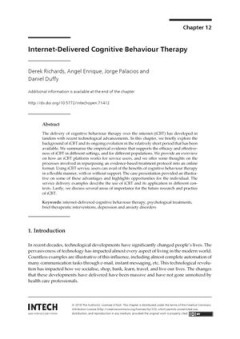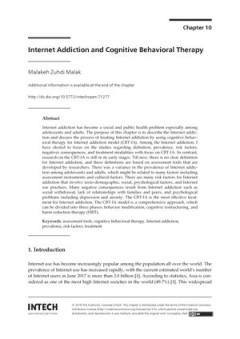Filter by

Internet-Delivered Cognitive Behaviour Therapy
The delivery of cognitive behaviour therapy over the internet (iCBT) has developed in tandem with recent technological advancements. In this chapter, we briefly explore the background of iCBT and its ongoing evolution in the relatively short period that has been available. We summarise the empirical evidence that supports the efficacy and effectiveness of iCBT in different settings, and for dif…
- Edition
- -
- ISBN/ISSN
- 9789535139270
- Collation
- -
- Series Title
- -
- Call Number
- -

Internet Addiction and Cognitive Behavioral Therapy
Internet addiction has become a social and public health problem especially among adolescents and adults. The purpose of this chapter is to describe the Internet addiction and discuss the process of treating Internet addiction by using cognitive behavioral therapy for Internet addiction model (CBT-IA). Among the Internet addiction, I have elected to focus on the studies regarding definition, pr…
- Edition
- -
- ISBN/ISSN
- 9789535139270
- Collation
- -
- Series Title
- -
- Call Number
- -

Antropologia da comunicação de massa
Este livro apresenta reflexões de pesquisadores brasileiros e argentinos sobre a comunicação de massa na perspectiva da antropologia. Nas últimas décadas tem crescido o interesse pela comunicação de massa dentro do campo da antropologia. Ela tem, cada vez mais, se voltado para temas contemporâneos buscando examiná-los à luz de um novo enfoque, que percebe sua complexidade, sem preconc…
- Edition
- -
- ISBN/ISSN
- 9788578793326
- Collation
- -
- Series Title
- -
- Call Number
- 300

An Archaeology of Early Christianity in Vanuatu: Kastom and Religious Change …
Religious change is at its core a material as much as a spiritual process. Beliefs related to intangible spirits, ghosts, or gods were enacted through material relationships between people, places, and objects. The archaeology of mission sites from Tanna and Erromango islands, southern Vanuatu (formerly the New Hebrides), offer an informative case study for understanding the material dimensions…
- Edition
- -
- ISBN/ISSN
- 9781760460747
- Collation
- -
- Series Title
- -
- Call Number
- 300

An Archaeology of Art and Writing: Early Egyptian Labels in Context
An Archaeology of Art and Writing offers an in-depth treatment of the image as material culture. Centring on early Egyptian bone, ivory, and wooden labels—one of the earliest inscribed and decorated object groups from burials in the lower Nile Valley—the research is anchored in the image as the site of material action. A key aim of this book is to outline a contextual and reflexive approach…
- Edition
- -
- ISBN/ISSN
- 9783946198369
- Collation
- -
- Series Title
- -
- Call Number
- 300

An Appalachian Symposium: Essays Written in Honor of Cratis D. Williams
Published in 1977, this collection of essays was published to honor Cratis D. Williams upon his retirement from Appalachian State University. Williams was an influential scholar, folklorist, teacher, and administrator who spent much of his career focused on the Appalachian region. Edited by J. W. Williamson, contributors to the volume are Louie Brown, Ronald J. Eller, Alan J. Crain, Stephen Fis…
- Edition
- -
- ISBN/ISSN
- 9781469638447
- Collation
- -
- Series Title
- -
- Call Number
- 300

After Confucius: Studies in Early Chinese Philosophy
After Confucius is a collection of eight studies of Chinese philosophy from the time of Confucius to the formation of the empire in the second and third centuries B.C.E. As detailed in a masterful introduction, each essay serves as a concrete example of "thick description" an approach invented by philosopher Gilbert Ryle, which aims to reveal the logic that informs an observable exchange among …
- Edition
- -
- ISBN/ISSN
- 9780824828424
- Collation
- -
- Series Title
- -
- Call Number
- 300

Semiconductor Packaging: Materials Interaction and Reliability
In semiconductor manufacturing, understanding how various materials behave and interact is critical to making a reliable and robust semiconductor package. Semiconductor Packaging: Materials Interaction and Reliability provides a fundamental understanding of the underlying physical properties of the materials used in a semiconductor package. By tying together the disparate elements essential to …
- Edition
- -
- ISBN/ISSN
- 9781439862070
- Collation
- -
- Series Title
- -
- Call Number
- -

Seeing the City Digitally; Processing Urban Space and Time
This book explores what's happening to ways of seeing urban spaces in the contemporary moment, when so many of the technologies through which cities are visualised are digital. Cities have always been pictured, in many media and for many different purposes. This edited collection explores how that picturing is changing in an era of digital visual culture. Analogue visual technologies like film …
- Edition
- -
- ISBN/ISSN
- 9789048551927
- Collation
- -
- Series Title
- -
- Call Number
- -

(Post-)colonial Archipelagos: omparing the Legacies of Spanish Colonialism in…
The Puerto Rican debt crisis, the challenges of social, political, and economic transition in Cuba, and the populist politics of Duterte in the Philippines—these topics are typically seen as disparate experiences of social reality. Though these island territories were colonized by the same two colonial powers—by the Spanish Empire and, after 1898, by the United States—research in the fiel…
- Edition
- -
- ISBN/ISSN
- 9780472133161
- Collation
- -
- Series Title
- -
- Call Number
- 300
 Computer Science, Information & General Works
Computer Science, Information & General Works  Philosophy & Psychology
Philosophy & Psychology  Religion
Religion  Social Sciences
Social Sciences  Language
Language  Pure Science
Pure Science  Applied Sciences
Applied Sciences  Art & Recreation
Art & Recreation  Literature
Literature  History & Geography
History & Geography